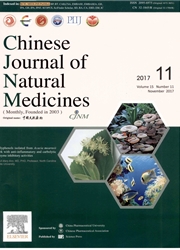

 中文摘要:
中文摘要:
In order to determine the chemical constituents of Cistanche deserticola cultured in Tarim desert,a systematically phytochemical investigation was carried out.The constituents were isolated by silica gel,Sephadex LH-20,MCI gel,ODS column chromatography,and semi-preparative HPLC.Their structures were determined on the basis of MS and NMR spectroscopic analyses,by chemical methods,and/or comparison with literature data.The anti-inflammatory activities of the isolates were evaluated for their inhibitory effects on the lipopolysaccharide(LPS)-induced nitric oxide(NO)production in BV-2 mouse microglial cells.Nine iridoids were isolated and identified as cistadesertoside A(1),cistanin(2),cistachlorin(3),6-deoxycatalpol(4),gluroside(5),kankanoside A(6),ajugol(7),bartsioside(8),and 8-epi-loganic acid(9).Compound 9 exhibited potent inhibition on the NO production with an IC50 value being 5.2 μmol·L-1,comparable to the positive control quercetin(4.3 μmol·L-1).Compound 1 was a new iridoid,and compounds 5,6,and 8 were isolated from this species for the first time.
 英文摘要:
英文摘要:
In order to determine the chemical constituents of Cistanche deserticola cultured in Tarim desert, a systematically phytochemical investigation was carried out. The constituents were isolated by silica gel, Sephadex LH-20, MCI gel, ODS column chromatography, and semi-preparative HPLC. Their structures were determined on the basis of MS and NMR spectroscopic analyses, by chemical methods, and/or comparison with literature data. The anti-inflammatory activities of the isolates were evaluated for their inhibitory effects on the lipopolysaccharide (LPS)-induced nitric oxide (NO) production in BV-2 mouse microglial cells. Nine iridoids were isolated and identified as cistadesertoside A (1), cistanin (2), cistachlorin (3), 6-deoxycatalpol (4), gluroside (5), kankanoside A (6), ajugol (7), bartsioside (8), and 8-epi-loganic acid (9). Compound 9 exhibited potent inhibition on the NO production with an IC50 value being 5.2 μmol-L 1, comparable to the positive control quercetin (4.3 μmol.L-1). Compound 1 was a new iridoid, and compounds 5, 6, and 8 were isolated from this species for the first time.
 同期刊论文项目
同期刊论文项目
 同项目期刊论文
同项目期刊论文
 Large-scale qualitative and quantitative characterization of components in Shenfu injection by integ
Large-scale qualitative and quantitative characterization of components in Shenfu injection by integ Characterization of in vitro and in vivo metabolites of carnosic acid, a natural antioxidant, by hig
Characterization of in vitro and in vivo metabolites of carnosic acid, a natural antioxidant, by hig Inhibitory constituents from the aerial parts of Polygala tenuifolia on LPS-induced NO production in
Inhibitory constituents from the aerial parts of Polygala tenuifolia on LPS-induced NO production in Characterization of the herb-derived components in rats following oral administration of Carthamus t
Characterization of the herb-derived components in rats following oral administration of Carthamus t Murradiate and murradiol, two structurally unique heterodimers of carbazole-monoterpene and carbazol
Murradiate and murradiol, two structurally unique heterodimers of carbazole-monoterpene and carbazol Selective Activation of Nociceptor TRPV1 Channel and Reversal of Inflammatory Pain in Mice by a Nove
Selective Activation of Nociceptor TRPV1 Channel and Reversal of Inflammatory Pain in Mice by a Nove Exotines A and B, Two Heterodimers of Isopentenyl-Substituted Indole and Coumarin Derivatives from M
Exotines A and B, Two Heterodimers of Isopentenyl-Substituted Indole and Coumarin Derivatives from M Homolog-focused profiling of ginsenosides based on the integration of step-wise formate anion-to-dep
Homolog-focused profiling of ginsenosides based on the integration of step-wise formate anion-to-dep Anti-Neuroinflammatory Effect of MC13, a Novel Coumarin Compound From Condiment Murraya, Through Inh
Anti-Neuroinflammatory Effect of MC13, a Novel Coumarin Compound From Condiment Murraya, Through Inh 期刊信息
期刊信息
